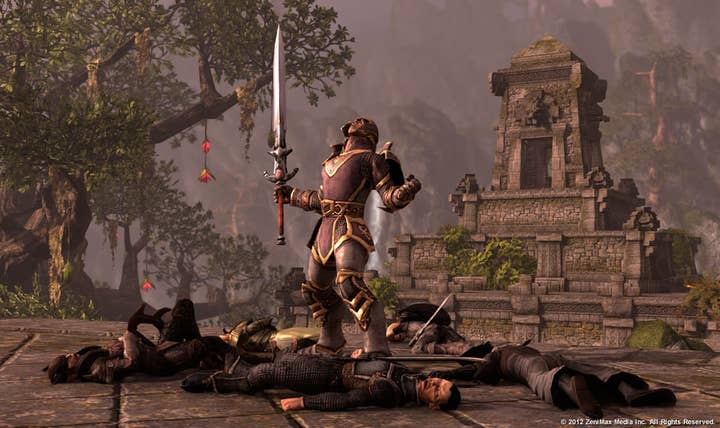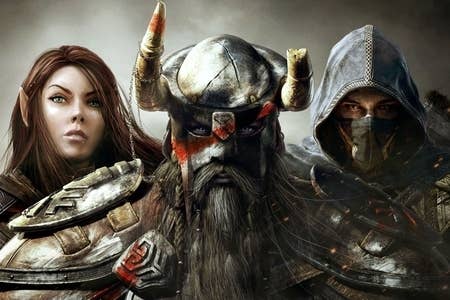Bethesda: Go Anywhere, Do Anything
With the industry's biggest talents now at ZeniMax and an Elder Scrolls MMO on the way, Pete Hines discusses Bethesda's bright future
Pete Hines' job used to be simpler. As vice president of PR and marketing at Bethesda, his primary concern has generally been the vast, immersive, first-person RPGs for which the studio is known. Vertical slicing games of such breadth and depth for the press and public is no small challenge - and at this point Hines has it down to an art - but a string of acquisitions by parent company ZeniMax Media in the last few years has significantly changed Bethesda's position in the industry, and, by proxy, the nature of Hines' role.
ZeniMax got the ball rolling with the iconic id Software in 2009, followed by an exceptionally busy 2010 in which Arkane Studios, Tango Gameworks and MachineGames all joined the group. This leaves Bethesda with one of the industry's most impressive talent rosters: at Arkane, Harvey Smith, Raphael Colantonio and Half-Life 2 art director Viktor Antonov; at Tango Gameworks, Shinji Mikami; at MachineGames, many of the founding members of Starbreeze. Hines believes that each of these companies share certain principles with Bethesda's existing teams, but their arrival has forever altered its creative capability.
"You're never going to see a Bethesda Game Studios game that's exactly like an id game, or a MachineGames game, or an Arkane game, or a Tango game"
"You're never going to see a Bethesda Game Studios game that's exactly like an id game, or a MachineGames game, or an Arkane game or a Tango game for that matter," he says. "What's great about this industry - what excites me personally and I think us as a company - is not just working on big games or big AAA titles; it's working on big AAA titles with people you genuinely like.
"Our industry is no different to any other other group of people in that there are really nice guys and there are people that you simply don't get along with; don't like, wouldn't have a beer with if you had to... And I can say that universally for all of the studios, whether it's Raf and Harvey at Arkane, whether it's Jens [Matthies] and all the guys at Machine Games, I just met with Shinji Mikami and our folks at Tango last week... All of those folks are simply great to work with in terms of the creativity and talent, but also just who they are as people and how easy it is to get along with them, to share ideas, and have it be a collaborative process."
The next game from Bethesda's teeming stable is Arkane's Dishonored, one of the sweethearts of this year's expo merry-go-round. For Hines, the design and mechanics of Dishonored "fit well" with what people already associate with the Bethesda name, a fact proven by the press reaction in its Gamescom demo room.

"I've noticed lots of journalists looking around, whether it's the screen next to them or the one over here, and noticing, 'none of these guys are where I am , none of them are doing what I'm doing.' In no way, shape or form is the game the scope or scale of Skyrim, but it's a similar kind of reaction, right?"
Having been on the receiving end of a number of Bethesda demos over the course of my career, I can only agree. Dishonored is a very different prospect from the traditional output of Bethesda Game Studios, but the way it empowers players to make choices and live with their decisions is a vital link. Whether the teams at Tango or MachineGames will offer that common ground is another matter, but the prospect of having to push a survival horror or cinematic action game clearly doesn't faze Hines - not when those games are the product of both ability and experience.
"You need the talent, and you also need guys that have been there before," he says. "These guys have been in this industry a long, long time, and so they understand some of the pitfalls of development and when you have to some guard rails up to say, 'Okay, well we can go this far but then we've got to stop here.' How to make sure that what you're trying to do is manageable and that you can actually finish it.
"You've seen plenty of games that have tried to do much and end up doing nothing well... I think that's an under appreciated talent in our industry. People get the creative side, but you also have to be disciplined enough to keep your team and not continue saying, 'Let's just keep doing more stuff and see what happens.'"
"Making sure that what you're trying to do is manageable and that you can actually finish it is an under appreciated talent in our industry"
If Dishonored performs as well as expected - and Tango, MachineGames and id Software can follow suit with their next releases - it will push Bethesda to a new level of success, a powerful force as both developer and publisher. But there is a potential wrinkle: The Elder Scrolls Online, an MMO of typically lofty ambitions that started development in the relatively welcoming climate of 2007. A lot has happened in the MMO market since then, much of it in the last two years, and while the incredible popularity of Skyrim is certainly encouraging, it hasn't left Hines entirely at ease.
"In one sense it does give us a sense of confidence in terms of people being aware of the Elder Scrolls," he says, "but we recognise that, while there are certainly a number of things about Elder Scrolls Online that share a commonality with Skyrim - setting, tone, themes, very basic things like races and exploring and being able to go where you want - it's also a very different kind of game. There are things that you can get away with and pull off in a single player game that you simply can't do in a multiplayer game.
"Part of what makes a Fallout or a Skyrim great is that we can custom craft the entire experience to be about you. There's no game balancing issues, like how are you versus this other person; there is no other person... Nobody else can screw with your experience. With an MMO, that changes to the nth degree. We now have to worry about if you found that sword, how does that sword change your relationship with everybody else in the world. And what you can do in PvP, and how much you can sell that for, and all of those different things are a huge shift."

Internally, The Elder Scrolls Online is being treated like an entirely new IP, and not just because it's the first game from the company's MMO studio, ZeniMax Online. According to Hines, very few assumptions have been made about the players' previous experience with The Elder Scrolls franchise, and the team is now pushing towards a point where the game will be able to answer any questions the public and press might have left. Like Dishonored and Skyrim, Hines believes the best way to showcase an MMO is to simply let you explore its world.
"There is that show don't tell mentality, particularly in the MMO space," Hines says. "We've realised that the next time we talk about it or show it the game itself is telling you and showing you exactly what it's about, rather than us saying, 'it's going to work like this.' You can wrap your head around it and prove out all the things we're talking about in terms of social connectivity, different kinds of combat, and all those things."
In the back end of 2012, however, very few MMOs can be taken on their own terms. There is tumult in virtually every part of the industry, but none more so than the MMO market, where the conditions that inspired the creation of The Elder Scrolls Online arguably no longer exist. The Old Republic has been pushed toward free-to-play, The Secret World performed below expectations, and the success of Guild Wars 2 has caused many to pontificate a final end for subscriptions in games of this type. The pursuit of World of Warcraft's level of success has been all but abandoned, and the market remains in a period of transition - far from ideal circumstances for launching Bethesda's first MMO.
"One of the things that we understand better having announced The Elder Scrolls Online is the extent to which we need to answer to things that have nothing to do with us"
"One of the things that we understand better having announced [The Elder Scrolls Online] is the extent to which we need to answer to things that have nothing to do with us," Hines says. "Because several somebody elses before us said X,Y or Z, as a result anybody's ability to trust or believe in what we're talking about is in some way affected by things that obviously we had nothing to do with... But that is the climate of [MMOs]. That's why we've really emphasised that the next thing has to show what it is we're planning to do, so that we're not talking about it as a reaction to those things."
All of which is just so much dancing around what business model The Elder Scrolls Online will adopt. Bethesda hasn't announced anything concrete, and Hines certainly isn't going to let anything slip until the company is good and ready, but it's reasonable to assume that Guild Wars 2's impressive sales and the popularity of The Lord of the Rings Online haven't gone unnoticed. Ultimately, Hines observes a lot of space between WoW-style subscriptions and Facebook-style micro-transactions, and in that space price matters less than how the player squares quality of experience with value for money.
"So you can look at something like horse armour," Hines says. "The reaction to horse armour wasn't just about price; it was more a lesson on when you're going to ask somebody to pay X, do they feel like they're getting Y in exchange. If they don't feel like they're getting their money's worth they're going to bitch.
"So it's not about the amount of money; it's about are you giving them really good value for what you're making them pay for. That's not an Elder Scrolls specific philosophy; I think that's a philosophy for us across everything, whether it's a game or DLC or an MMO or whatever. We have to make sure we're providing enough quality for what you're paying for, whatever you're paying for, so that the customer feels satisfied that, 'I got good value for my money.'"

